
“Today’s Liturgy speaks to us about Christian identity”, Francis began, following up immediately with the central question: “What is this Christian identity?”. Referring to the First Reading of the day (2 Cor 1:18-22), the Pope recalled that “Paul begins by speaking to the Corinthians about the things they had endured, several events of persecution”, and “the testimony they bore to Jesus Christ”. In effect, he writes to them: “I boast of this — that is, I boast about my Christian identity — which has been like this. God is the witness that our word toward you is ‘yes’, in other words, that we speak to you about our identity”.
“To arrive at this Christian identity”, Pope Francis explained, “God, our Father, made us take a long journey in history, centuries and centuries, with allegorical figures, with promises, covenants and likewise, until the moment of the fullness of time, when He sent his Son, born of woman”. Thus, it is “a long journey”. And, the Pope affirmed, “we too must make a long journey in our life, so this Christian identity may be strong and bear testimony”. A journey, he indicated, “which we can determine from ambiguity to the true identity”.
Thus, in the Letter to the Corinthians, the Apostle writes that “our word to you has not been Yes and No”, ambiguous. In fact, Paul adds, “the Son of God, Jesus Christ, whom we preached among you … was not Yes and No; but in him it is always Yes”. It is here then, the Pope said, that “our identity is actually found: in imitating, in following this Jesus Christ, who is God’s ‘yes’ toward us”. And “this is our life: going every day to strengthen this identity and bearing testimony to it, step by step, but always toward the ‘yes’, not ambiguously”.
“It’s true”, the Pontiff acknowledged, “there is sin and sin makes us fall, but we have the strength of the Lord to pick ourselves up and move forward with our identity”. But, he added, “I would also say that sin is part of our identity: we are sinners, but sinners with faith in Jesus Christ”. Indeed, “it is not simply a faith of awareness” but “a faith which is a gift of God that has entered us from God”. Thus, the Pope explained, “it is God himself who confirms us in Christ”. And he has anointed us, placed the seal on us, provided us with a surety, the pledge of the Spirit in our hearts”. Yes, Francis emphasized, “it is God who gives us this gift of identity” and “the problem is to be faithful to this Christian identity and allow the Holy Spirit, who is our very guarantee, the pledge in our heart, to lead us forward in life”.
“We are people who do not follow a philosopher”, the Pontiff stated, because “we have a gift, which is our identity: we are anointed, we have the seal placed on us and we have the guarantee within us, the guarantee of the Holy Spirit”. And “Heaven begins here, it is a beautiful identity that shows itself in testimony”. This is why, he added, “Jesus speaks to us of testimony as the language of our Christian identity” when he says: “You are the salt of the earth; but if salt has lost its taste, how shall its saltness be restored?”. The reference was taken from the day’s Reading from the Gospel of Matthew (5:13-16).
Surely, the Pope continued, “Christian identity, because we are sinners, is also tempted, is tempted — temptations always come — and it can go backwards, it can weaken and become lost”. But how can this happen? “I think”, said the Pontiff, “that one can go backwards on two main paths”.
The first, he explained, is “that of moving from testimony to ideas”, which is “watering down the testimony”. It’s as if to say, “Yes, I’m a Christian, this is Christianity, a beautiful idea, I pray to God”. But “in this way, we go from the concrete Christ, because the Christian identity is concrete — we read it in the Beatitudes; this concreteness is also in Chapter 25 of Matthew — from this somewhat soft religion, to air, and to the path of the agnostics”. Behind it, however, “there is scandal: this Christian identity is scandalous”. As a result, “the temptation is to say ‘no, no, without scandal; the cross is a scandal; that God became man” is “another scandal”, and it is left aside; we are looking for God “with this somewhat ethereal, airy Christian spirituality”. Thus, the Pope said, “there are modern agnostics, and they propose to you this and that: no, the last word of God is Jesus Christ, there is no other!”.
“On this path”, Francis continued, there are also “those who always need newness from the Christian identity: they have forgotten that they were chosen, anointed, that they have the guarantee of the Spirit, and they search: ‘Where are the prophets who tell us today the letter that Our Lady will send us at 4:00 in the afternoon?’, for example, no? They live by this”. But “this is not the Christian identity. The last word of God is called ‘Jesus’ and nothing more”.
“Another way to go backwards from the Christian identity is worldliness”, the Pope said. And this means to “expand the conscience so far that everything can enter: ‘Yes, we are Christians, but this yes…’, not only morally but also in a human sense”. Because “worldliness is human, and this is how salt loses its flavour”. This is why, the Pope explained, “we see Christian communities, even Christians, who say they are Christian, but cannot and do not know how to bear testimony to Jesus Christ”. And “this is how the identity goes backwards, backwards and becomes lost”. It is “this worldly nominalism that we see every day”.
“In salvation history, God, with his Fatherly patience, has led us from ambiguity to certainty, to the concreteness of the incarnation and redeeming death of his Son: this is our identity”. And “Paul boasts of this: Jesus Christ, made man: God, the Son of God, became man and died in obedience”. Yes, the Pontiff remarked, Paul “boasts of this” and “this is the identity and there lies the testimony”. It is “a grace we must ask of the Lord: that he always give us this gift, this gift of an identity which doesn’t seek to adapt to things that would make it lose its saltness”.
Before moving on to celebrate the Eucharist, Francis took the opportunity to say that it too is “a ‘scandal’”. Moreover, he concluded, “Allow me to say ‘a twofold scandal’”. First, he explained, “because it is the ‘scandal’ of the Cross: Jesus, the Son of God, who gives his life for us”. And second, “the ‘scandal’ that we Christians celebrate the memorial of the death of the Lord and we know that here this remembrance is renewed”. Thus the very celebration of the Eucharist “is testimony of our Christian identity”.

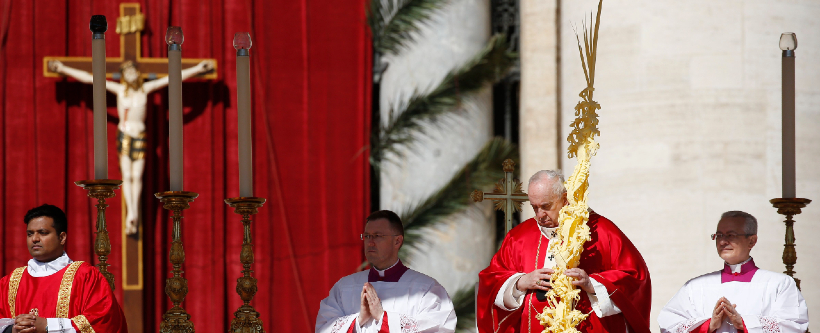
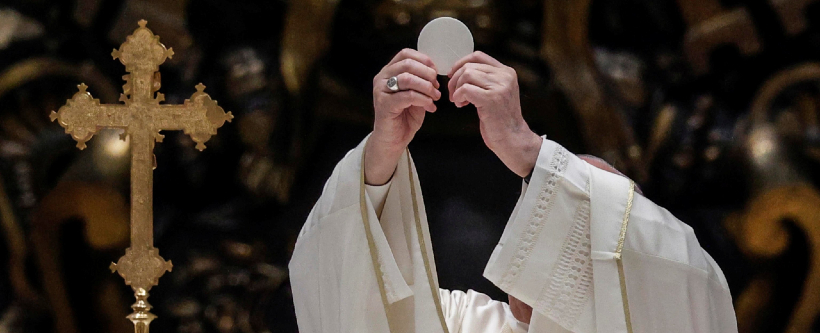
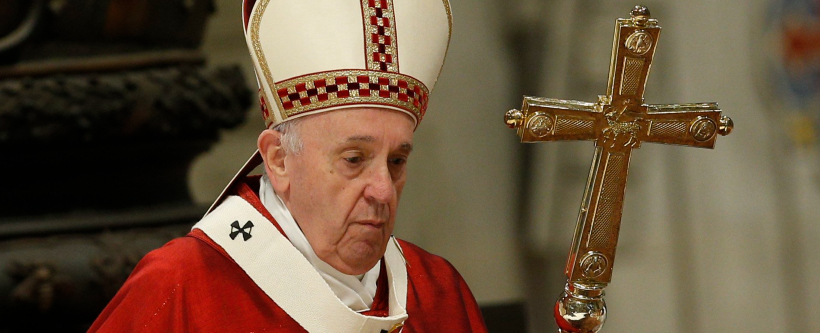
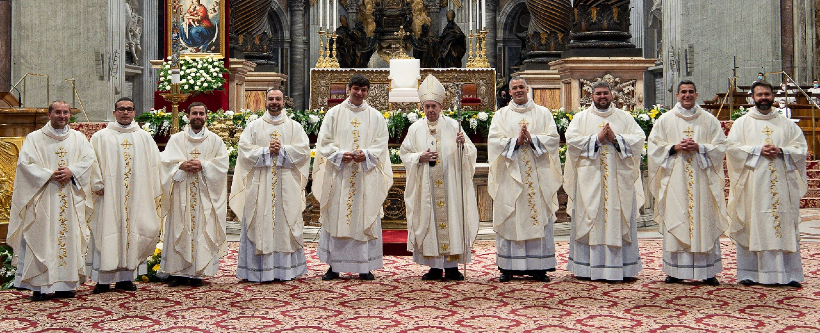
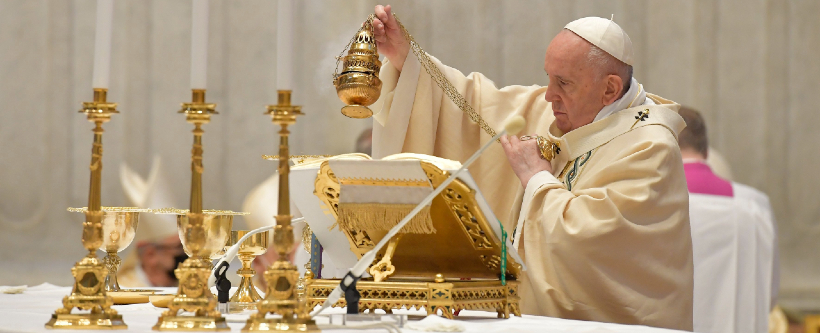
Facebook Comments